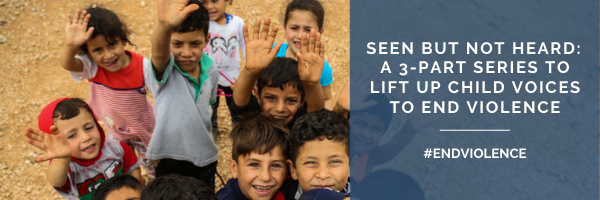
Intergenerational Dialogue on Child Participation: Event Summary
Child participation is a central pillar in preventing and ending violence against children. The JLI’s Ending Violence Against Children (EVAC) Learning Hub invited children from around the world to share their reflections of child participation, during our final webinar in the series Seen But Not Heard: A 3-Part Series to Lift Up Child Voices to End Violence.
Related link: view the JLI’s Evidence Guide on the role of faith communities in ending violence against children, for key learnings, case studies and data from the JLI Scoping Study on Ending Violence Against Children.
Intergenerational Dialogue on Child Participation brought together practitioners and policy-makers in conversation with Bahá’í, Christian and Muslim children from Chile, South Africa and Pakistan.
Speakers included:
- Children from Bahá’í Community in Chile with Ms Loreto Jara, Bahá’í Community in Chile
- Children from Muslim Community in Pakistan with Ms Afshan Jamal, Islamic Relief, Pakistan
- Children from various faith communities in South Africa with Ms Christina Nomdo, Commissioner for Children, Western Cape, South Africa
The children were presented with a number of questions about child participation in their communities.
Question: Why is it important to hear the voices of children?
One child underlined one key impact of giving a platform to children’s voices. “[If] elders hear our voices…this will increase our trust for ourselves”. However, a child from Pakistan pointed out the importance of adopting a gender sensitive lens when promoting child participation, noting that in her community boys’ voices were often given greater weight than girls.
Question: How does your community make spaces for child participation?
The children shared some examples of how their community supported or encouraged child participation, but also their concerns on where they felt support for child participation was lacking.
A child from the Bahá’í community in Chile spoke of how elders in her community always ask for the opinion of children. “They want to know what you think. They don’t just ignore you”. Children are invited and encouraged to contribute to communal prayers. A Muslim child from South Africa echoed how children participated in communal prayers at the mosque.
However, some of the children identified shortcomings in their community’s approach to child participation. Children from Pakistan said that while they had some opportunities to participate, these opportunities were not enough – and that too often, decisions were still being made for children without children being consulted. A Christian child from South Africa noted that the reason children can’t sit still at church is because they have no input there – they are never asked what they would like to hear, sing or see at church.
Question: What impact has COVID-19 had on children in your community?
The children had varying experiences of how the COVID-19 pandemic had affected their participation with their faith community. All of them had experienced the closure of mosques, churches and temples. The children from Pakistan said that while there had not been enough opportunities for participating in different activities before COVID-19, now they are restricted and cannot go anywhere at all.
However, some of the children spoke about how their communities had adapted during the COVID-19 crisis. Bahá’í children said that their community had shifted services to online platforms such as Zoom, while a Christian child from South Africa gave the example of her Sunday school using videos and social media platforms to continue reaching out to children throughout the pandemic.
Question: How can faith leaders improve child participation in your community?
The children all agreed on the need for more intergenerational dialogue within faith communities. A Bahá’í child from Chile spoke of the need for religious leaders to be more involved in junior youth groups and children’s classes; a Christian child from South Africa recommended more team building activities between children and adults; while another Bahá’í child mentioned the need for more junior groups in their faith community.
This was a call shared by children from Pakistan, who also emphasised the important role of religious leaders in changing social behaviours and teaching communities about children’s rights. A Bahá’í child from Chile agreed that religious leaders had an important role to play in ensuring community spaces were inclusive for all groups of children, and that no child is left behind. A Christian child from South Africa called for more radical action on child participation, proposing that community leaders should hand control of some church services over to children. She noted that, “most children don’t want to go to church because they feel like…nobody understands them there. But who understands children better than other children?”
Following the contributions by the children, practitioners and policymakers were invited to share their reflections on how faith communities can support child participation, create respectful dialogue between adults and children, and disrupt the power hierarchies that disenfranchise children.
Vea el resumen en español
Catch up on the Seen But Not Heard Events here:
- Multi-religious Perspectives on Child Participation (y el resumen en español)
- Practical Examples of Child Participation (y el resumen en español)
View the EVAC Evidence Guide o lea en español
View the webinar slides below.

